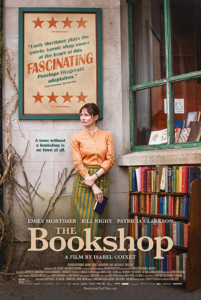Poorly shot and plodding, “The Bookshop” wastes solid performances and a plot with potential.

 When widow Florence Green (Emily Mortimer) opens a bookshop in a small seaside town, she finds a spot of opposition. Local, rich powerbroker Violet Gamart (Patricia Clarkson) wants to open something referred to as an “arts center” in the location that Florence has purchased. But when the reclusive, bookish Edmund Brundish (Bill Nighy) takes an interest in the shop, she might have found an important ally.
When widow Florence Green (Emily Mortimer) opens a bookshop in a small seaside town, she finds a spot of opposition. Local, rich powerbroker Violet Gamart (Patricia Clarkson) wants to open something referred to as an “arts center” in the location that Florence has purchased. But when the reclusive, bookish Edmund Brundish (Bill Nighy) takes an interest in the shop, she might have found an important ally.
Winning Brundish over starts when Florence sends him a copy of Ray Bradbury’s “Fahrenheit 451.” There is an early moment when I thought this movie might be about literature and even the modern novel. And as Florence seeks to spice up her shop’s offerings and decides to carry copies of Vladimir Nabokov’s “Lolita,” I was intrigued. But quickly this potentially literate plot point is abandoned for a passing dalliance with a teased May-December romance and a conflict over a building that may be forcibly acquired by law.

A small story set in 1959 that should have been given better treatment, talented, Spanish director Isabel Coixet fails to translate the British material in an impactful way. There’s something missing from the compressed narrative. It’s an awkward film that meanders about to an unsatisfying conclusion. The very structure of the tale seems incomplete, relying on a didactic narration that hints at a better story that should have been pursued in greater depth.

Aside from the thin narrative, what confounds me is why it is so haphazardly shot? Cinematographer Jean-Claude Larrieu certainly has loads of experience, but this film is inconsistently lensed, at best. Some shots are artful and others are positively head scratching featuring amateurish composition that distracts from scenes that should have held some kind of emotional import. It is as if the second unit handled whole scenes. And with the top drawer cast and reported budget, it literally makes no sense that this film doesn’t look like a typical, perfectly lit, handsomely captured, if stiff British production.
Penelope Fitzgerald’s 1978 novel “The Bookshop,” upon which this film is based, dealt with the concept of eminent domain, reportedly personalizing the negative effect of confiscation from Florence’s perspective. I’ve not read the book, but as adapted, the movie clumsily handles this important topic.

There’s just nothing to Florence’s struggle in the film, and the theme of the little man squashed by the government and the rich establishment falls on deaf ears. This is a real pity, because Mortimer is perfect for the role of a sensitive widow, who only wants to share her love of reading to honor her late husband. And then there’s Nighy and Clarkston, both of which can play sensitive and a monster to great effect. Wasted is an understatement.
“The Bookshop” lacks some essential ingredient that would draw us in and make us care about the plight of a widow attacked by a conservative, insensitive ruling class. It’s a poorly constructed film, that just happens to feature some great British actors given little to do.
